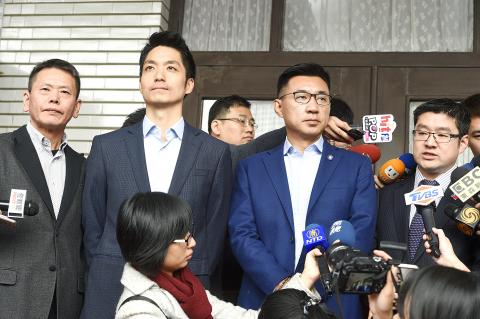Seven Chinese Nationalist Party (KMT) Central Standing Committee members, including legislators Johnny Chiang (江啟臣) and Chiang Wan-an (蔣萬安), have announced their resignations from the committee to reform the party following its defeats in Saturday’s elections.
The party must thoroughly review its losses in the presidential and legislative elections and promote reforms, Johnny Chiang said on Facebook late on Monday.
Saying every single party member is responsible for the KMT’s defeats, he added that he would resign from the committee and urged its other members to follow suit.

Photo: George Tsorng, Taipei Times
“To regain the trust of the people, the KMT must undergo a complete transformation,” Johnny Chiang said.
After all committee members resign, the party should form a provisional decisionmaking committee consisting of KMT mayors, county councilors, council speakers and a number of legislators to lead the party as it reforms its policy stance and power structure, he said.
Younger lawmakers who are competent and receptive to the public’s needs, such as KMT legislators Lee Yen-hsiu (李彥秀) and Ko Chih-en (柯志恩), should be promoted to the party’s upper management, he added.
Within several hours, six more committee members announced that they would join Johnny Chiang in resigning from the committee with the aim of reforming the party.
They were legislators Chiang Wan-an, Huang Chao-shun (黃昭順) and Shen Chih-huei (沈智慧), legislator-elect Yang Chiung-ying (楊瓊瓔), Changhua County Council Speaker Hsien Tien-lin (謝典林) and Taipei City Councilor William Hsu (徐弘庭).
While KMT Chairman Wu Den-yih (吳敦義) had said that he would formally tender his resignation at a committee meeting today, Hsu said that the committee “does not need to and should not decide on Wu’s resignation.”
Asked outside the Legislative Yuan in Taipei yesterday if he intends to run for chairman after Wu steps down, Johnny Chiang said that “the chairmanship election is not a priority at this stage.”
People are more concerned about whether the KMT can review its mistakes, act responsibly and understand the public’s wishes, he said.
Asked the same question, Chiang Wan-an said that irrespective of his position, he would do his best to promote reforms in the party.
He added that he resigned from the committee because its current decisionmaking model “can no longer quickly and effectively respond to changes in the public’s will.”
Separately, committee member Lee Chao-ping (李昭平) said that while he agrees that all committee members should resign, if they do so immediately, it could cause today’s meeting to be canceled.
Without the meeting, Wu might be allowed to remain in his post instead of taking responsibility for the electoral defeats, he said.
Meanwhile, the KMT said in a written statement that all committee members’ terms ended in October last year, but elections had been postponed due to Saturday’s polls.
As a result, their resignations are a nonissue, the party said.
Wu and all executive-level members involved in the elections would resign at today’s meeting, it said.
A chairperson by-election and committee elections would be held on March 7, it added.
Additional reporting by CNA

US climber Alex Honnold is to attempt to scale Taipei 101 without a rope and harness in a live Netflix special on Jan. 24, the streaming platform announced on Wednesday. Accounting for the time difference, the two-hour broadcast of Honnold’s climb, called Skyscraper Live, is to air on Jan. 23 in the US, Netflix said in a statement. Honnold, 40, was the first person ever to free solo climb the 900m El Capitan rock formation in Yosemite National Park — a feat that was recorded and later made into the 2018 documentary film Free Solo. Netflix previewed Skyscraper Live in October, after videos

NUMBERS IMBALANCE: More than 4 million Taiwanese have visited China this year, while only about half a million Chinese have visited here Beijing has yet to respond to Taiwan’s requests for negotiation over matters related to the recovery of cross-strait tourism, the Tourism Administration said yesterday. Taiwan’s tourism authority issued the statement after Chinese-language daily the China Times reported yesterday that the government’s policy of banning group tours to China does not stop Taiwanese from visiting the country. As of October, more than 4.2 million had traveled to China this year, exceeding last year. Beijing estimated the number of Taiwanese tourists in China could reach 4.5 million this year. By contrast, only 500,000 Chinese tourists are expected in Taiwan, the report said. The report

Temperatures are forecast to drop steadily as a continental cold air mass moves across Taiwan, with some areas also likely to see heavy rainfall, the Central Weather Administration (CWA) said. From today through early tomorrow, a cold air mass would keep temperatures low across central and northern Taiwan, and the eastern half of Taiwan proper, with isolated brief showers forecast along Keelung’s north coast, Taipei and New Taipei City’s mountainous areas and eastern Taiwan, it said. Lows of 11°C to 15°C are forecast in central and northern Taiwan, Yilan County, and the outlying Kinmen and Lienchiang (Matsu) counties, and 14°C to 17°C

STEERING FAILURE: The first boat of its class is experiencing teething issues as it readies for acceptance by the navy, according to a recent story about rudder failure The Hai Kun (海鯤), the nation’s first locally built submarine, allegedly suffered a total failure of stern hydraulic systems during the second round of sea acceptance trials on June 26, and sailors were forced to manually operate the X-rudder to turn the submarine and return to port, news Web site Mirror Daily reported yesterday. The report said that tugboats following the Hai Kun assisted the submarine in avoiding collisions with other ships due to the X-rudder malfunctioning. At the time of the report, the submarine had completed its trials and was scheduled to begin diving and surfacing tests in shallow areas. The X-rudder,